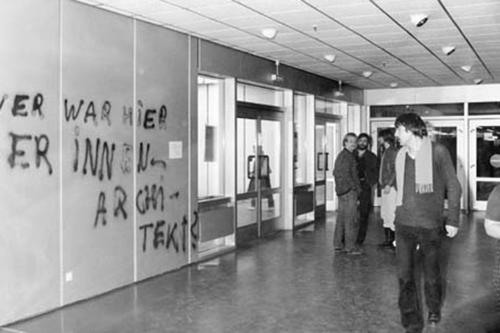The 1970s and 1980s
Corridors and lobbies of the university served as a forum for expression and debate, ca.1977.
Image Credit: Reinhard Friedrich / Freie Universität Berlin, Universitätsarchiv
After the attempt to assassinate Rudi Dutschke, the Extra-Parliamentary Opposition disintegrated into a great number of mutually hostile factions. Activist splinter groups (such as the Red Cells and the K Groups), whose aim was the revolutionary overthrow of the political system in the Federal Republic of Germany, found many supporters at Freie Universität. Strikes, campaigns against individual professors, and skirmishes with police units deployed in several institutes to ensure the continuation of teaching now characterized the public face of Freie Universität. A commonality of teachers and students no longer existed.
During the late 1970s, the number of students tripled and Freie Universität became a mass university. The "Radicals Decree" and the deterioration of conditions for studying sparked off frequent student protests. In spite of the difficult state of affairs and over-regulation of university education by the State, Freie Universität went through a phase of consolidation in the early 1980s. The critical situation caused by years of underfinancing led in 1988 and 1989 to student protests lasting several weeks.

